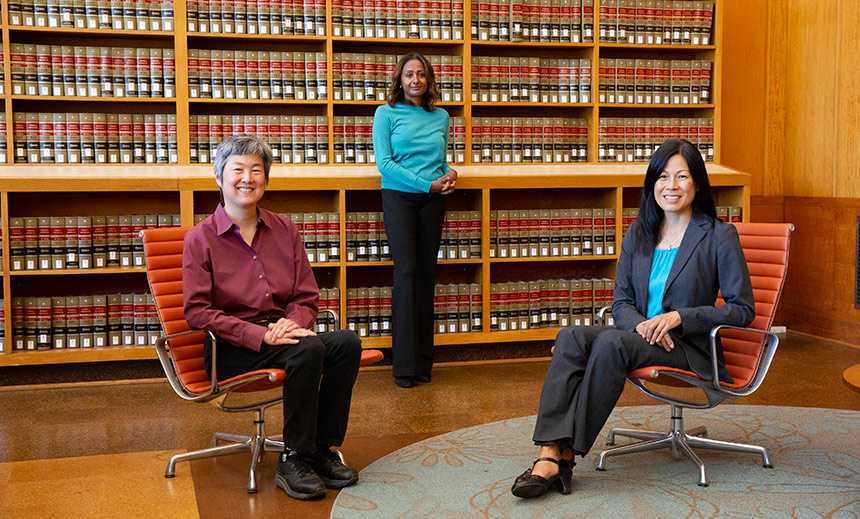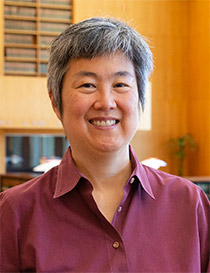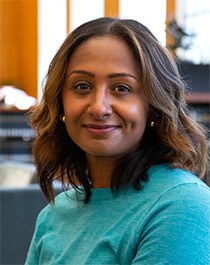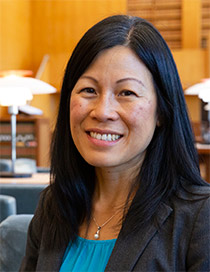
By Andrew Cohen
Linda Tam ’00 spent two decades fighting for immigrant rights. Urmila Taylor worked 12 years at the Social Security Administration after starting as a law-firm associate. Margaret Wu ’96 also started in private practice before serving for 14 years in the UC Office of General Counsel.
A common thread that extended and enhanced their far-reaching career tapestries: legal writing.
“Writing is the most fundamental of lawyering skills,” Tam says. “When I was a law student, my skills-based classes were my favorite. They were also the most helpful classes for my career.”
Tam, Taylor, and Wu are now helping to hone those skills as Berkeley Law’s newest legal writing professors. A 1L curriculum staple and longtime point of emphasis for the school, its Legal Research, Analysis, and Writing Program teaches students how to effectively approach, dissect, and discuss legal issues, and how to tailor their writing to serve clients’ divergent needs.
At Berkeley Law, legal writing professors are full-time faculty who bring significant practice experience and meaningful teaching chops to the classroom — averaging more than 10 years of teaching per instructor. Working closely with first-year students in both semesters, they provide valuable, highly individualized feedback and routinely develop mentoring relationships.

“I find it really rewarding to help students learn the skills and tools they’ll use to become terrific new lawyers while simultaneously learning from them how I can be a better teacher,” Wu says. “I’m also so grateful to be working with such a supportive and accomplished team of legal writing professors who have generously shared their expertise, and with whom I can exchange ideas.”
Using simulations based on real case facts, students represent mock clients in disputes that grow increasingly complex over the course of the year. Students research and learn the substantive law relating to each problem, and test that understanding through status reports to supervisors, classroom presentations, and other exercises. They often hear from practitioners and judges to gain insights into the strategic considerations that can drive litigation.
And — of course — they write, producing both formal and informal office memoranda in the fall semester and a persuasive trial court brief in the spring. A highlight for most students is delivering their oral argument at the end of the spring semester, a chance to face opposing counsel and tough judges as they argue the points they spent all semester briefing.
No stranger to supervising
During her first few years at the Social Security Administration, Taylor litigated full time as a staff attorney and wrote numerous briefs. Over the last several years, she ran the agency’s federal litigation practice for the Ninth Circuit and the district courts within it.

“My favorite part of that role was not being responsible for overseeing more that 2,000 cases a year — unsurprisingly,” she says. “It was that I also became responsible for training our staff attorneys on legal research and writing as it pertained specifically to the complex regulatory scheme the agency administers.”
Taylor developed a comprehensive training program by creating sample fact patterns; teaching attorneys how to spot relevant issues within those fact patterns and how to write persuasive briefs applying the statute, regulations, and case law; and reviewing and editing those briefs to help the attorneys improve their writing.
“That work is in many ways similar to the work I do as a legal research and writing professor,” she says. “I also ran a program where fellow supervisors and senior attorneys would ‘moot’ attorneys before district court hearings and oral arguments before the Ninth Circuit — not unlike what happens at the end of Written and Oral Argument in the spring semester. I love teaching, and in particular, teaching this class.”
Tam, founding director of the Immigration Law Program at the school’s East Bay Community Law Center, worked for over 15 years there as a lecturer, instructor, and staff attorney. After two years away from Berkeley Law, she relishes returning and reengaging with its students.

“My goal is to demystify lawyering and help them gain their footing in law school,” Tam says. “They’re such an interesting, diverse group, really engaged and interested in learning, and thoughtful about the world they live in. Over the years, I’ve been so impressed to see what my former students have done and the impact they have made in the world. I feel honored to be a part of their professional journey.”
Wu encourages students to join one of Berkeley Law’s 13 student journals to hone their writing and editing skills and to master citation formatting through the Bluebook. As an educator, she notes the myriad online teaching resources available to the legal writing faculty, and the increased effort to address what students learn and experience in law school in the broader context of what happens in the world around them.
Noting that students can draw from the instructors’ wide-ranging experience, Wu says the program “teaches skills that are useful across different areas and types of law practice” and “provides helpful context in teaching students how certain concepts and skills they learn in class could come into play in the real world.”